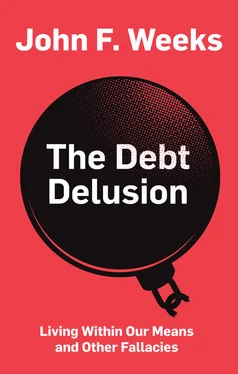“John Weeks is a distinguished and worldly economist who, long before it became fashionable, rigorously, and to devastating effect, contested the intellectual foundations of neoliberal economics. His generosity in sharing his deep knowledge of economic theory, policies and systems has inspired and motivated many thousands of students, policy makers and activists. His work in discrediting the policies of austerity laid the foundations on which Labour’s Corbyn movement was built and popularized.”
Ann Pettifor, Director, Prime Economics
“Austerity is one of the greatest deceptions foisted on the British public in modern history. It was based on ideological economics designed to accelerate the dismantling of the social state and the privatization of the commons. John Weeks has been a consistent principled critic since the austerity era was launched. His scorn should be welcomed.”
Guy Standing, SOAS, University of London
“John Weeks has been one of the most powerful critics of mainstream neoclassical economics and of neoliberal economic policies in the last few decades. His analyses are razor-sharp and his criticisms unsparing, but he uses them to propose ways to build a solidaristic economy and a compassionate society.”
Ha-Joon Chang, University of Cambridge
“John Weeks has been a vigorous campaigner against the fallacies of neoliberal economics. He is a model to us all in his energy and resilience in making the case for a more progressive economics and promoting an alternative approach to economic policy making that is sorely needed. He draws on his long and valuable experience in teaching, research and advising governments around the world. It is a tribute to his influence and his clarity of exposition that his students are now taking his ideas forward both at home and abroad.”
Susan Himmelweit, Open University
For my son Matthew Dore-Weeks
The Debt Delusion
Living Within Our Means and Other Fallacies
John F. Weeks
polity
Copyright © John F. Weeks 2020
The right of John F. Weeks to be identified as Author of this Work has been asserted in accordance with the UK Copyright, Designs and Patents Act 1988.
First published in 2020 by Polity Press
Polity Press
65 Bridge Street
Cambridge CB2 1UR, UK
Polity Press
101 Station Landing
Suite 300
Medford, MA 02155, USA
All rights reserved. Except for the quotation of short passages for the purpose of criticism and review, no part of this publication may be reproduced, stored in a retrieval system or transmitted, in any form or by any means, electronic, mechanical, photocopying, recording or otherwise, without the prior permission of the publisher.
ISBN-13: 978-1-5095-3296-4
A catalogue record for this book is available from the British Library.
Library of Congress Cataloging-in-Publication Data
Names: Weeks, John, 1941- author.
Title: The debt delusion : living within our means and other fallacies / John Weeks.
Description: Cambridge, UK ; Medford, MA : Polity Press, 2019. | Includes bibliographical references and index.
Identifiers: LCCN 2019016223 (print) | LCCN 2019018253 (ebook) | ISBN 9781509532964 (Epub) | ISBN 9781509532933 (hardback) | ISBN 9781509532940 (pbk.)
Subjects: LCSH: Debts, Public. | Finance, Public. | Government spending policy. | Fiscal policy.
Classification: LCC HJ8015 (ebook) | LCC HJ8015 .W44 2019 (print) | DDC 336.3/4--dc23
LC record available at https://lccn.loc.gov/2019016223
The publisher has used its best endeavours to ensure that the URLs for external websites referred to in this book are correct and active at the time of going to press. However, the publisher has no responsibility for the websites and can make no guarantee that a site will remain live or that the content is or will remain appropriate.
Every effort has been made to trace all copyright holders, but if any have been overlooked the publisher will be pleased to include any necessary credits in any subsequent reprint or edition.
For further information on Polity, visit our website: politybooks.com
Introduction: Debt, Deficits and Austerity
A Citizen’s Guide
In the second stanza of Lewis Carroll’s The Hunting of the Snark , the Bellman tells the rest of the ship’s crew, “I have said it thrice: What I tell you three times is true.” This propaganda technique of repetition establishes familiarity then credibility even to obvious contractions of reality. The austerity narrative – governments should spend no more than their tax incomes – provides powerful proof of the effectiveness of repletion to give myth credibility.
Central to the general acceptance of myths about government budgets is lack of basic understanding by citizens of public spending and taxation. Lack of understanding becomes misunderstanding under the assault of propaganda and provides fertile soil for converting myth into conventional wisdom (a term coined with analytical insight by the US economist and diplomat John Kenneth Galbraith). Knowledge provides the tool to expose myths as the non-credible parables they are, to reveal conventional wisdom as myth no matter how frequent the repetition.
Informed citizens provide the foundation of democratic society. Participating through democratic institutions, we the citizens facilitate effective government. Understanding government finances is central to that participation. Participation creates engagement, so that the citizen becomes the active subject of policy discussion rather than the passive object.
Ill-informed citizens fall prey to cynicism that undermines democratic participation by inducing alienated passivity. Through fostering the ignorance that generates cynicism, governments can rule on behalf of the special interests rather than for the general welfare. Governments serving the few neutralize and undermine democracy, claiming to bring order and stability to replace disorder and disarray – disorder and disarray typically generated by their special interest policies.
In both Europe and the United States, few public issues are as consistently misrepresented as government budgets. The misrepresentation facilitates policies that undermine rather than enhance the public welfare. To defend special interests, governments use these misrepresentations to justify policies that weaken the ability of the public to participate as citizens. Central to that weakening is the superficially reasonable proposition that, complex as it is, public finance should be left to experts. The final chapter of this book inspects this proposition and rejects it.
Misrepresentation and bogus appeal to experts distort public debate on how much governments should spend, how that spending should be funded, and who should benefit. As a result, a very large part of public discussion over government spending and tax does not inform. It misinforms and leaves citizens knowing less, not more, accepting myths as if they were common sense. Polemics marshal the language of myth to combat the wisdom and insight that facilitate democratic decision making.
A substantial part of the public hesitates from engaging in discussion of government budgets because of an imagined lack of expertise. Citizens retreat from what they believe is a complex subject, offering the plea “I am not an economist,” and “Economics is too dull and difficult to try to understand.” These laments result from the inculcation of misinformation through extensive and pervasive propaganda. Public-sector spending and taxation are overwhelmingly about politics and only secondarily about economics. Yet many politicians and much of the media discuss public finances as if the reverse were the case. Debates over political priorities are too frequently treated as if they were a technical matter for experts. The need for expertise in a democratic society is important and its role is clear – experts advise, politicians decide, and citizens elect.
Читать дальше












